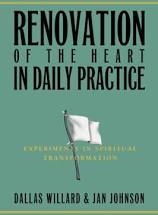THE VIVID AND ETERNAL DRAMA OF GOD - In the progression toward complete identification of our will with God’s, first there is surrender. When we surrender our will to God, we consent to his supremacy in all things. We may not be able to do his will, but we are willing to will it.
In this condition there is still much grumbling and complaining about our lives and about God. If grace and wisdom prevail in our surrendered life, we move on to abandonment. No part of us holds back from God’s will any longer.
Typically, at this point, surrender now covers all the circumstances of life. We begin to live in this astonishing reality: Irredeemable harm does not befall those who willingly live in the hand of God. Beyond abandonment is contentment with the will of God, not only with his being who he is and ordaining what he has ordained in general but also with the lot that has fallen to us.
At this point, gratitude and joy are the steady tone of our lives. We are now assured that God has done, and will always do, well by us—no matter what! Dreary, foot-dragging surrender to God looks like a far distant country. Duplicity looks like utter foolishness in which no sane person would be involved. Beyond contentment lies intelligent, energetic participation in accomplishing God’s will in our world. We are no longer spectators but are caught up in a vivid and eternal drama in which we play an essential part.
We embrace our imposed circumstances, no matter how tragic they seem, and act for the good in a power beyond ourselves. “We are reigning—exercising dominion—in life by One, Christ Jesus” (Romans 5:17, PAR), looking toward an eternity of reigning with God through ages of ages (see Revelation 22:5). Our tiny willpower is not the source of our strength. Instead, we are carried along by the power of the divine drama within which we live actively engaged. This is the real meaning of “Yet not I, but Christ liveth in me” (Galatians 2:20, KJV). The strongest human will is always the one that is surrendered to God’s will and acts with it.































